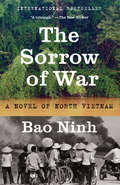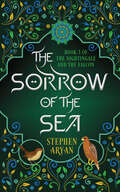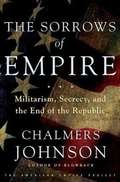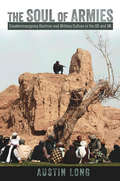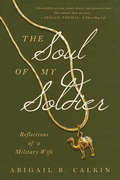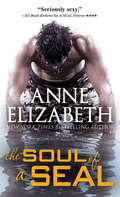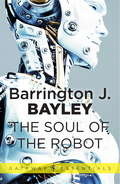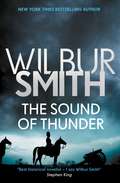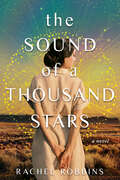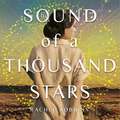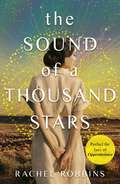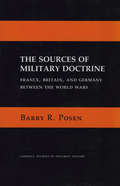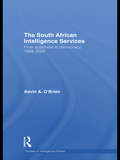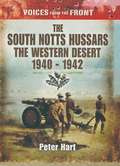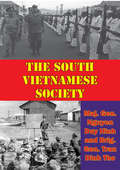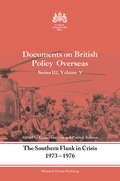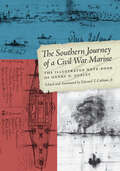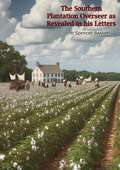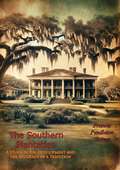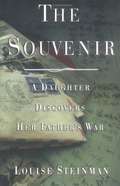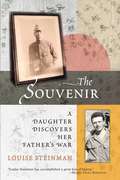- Table View
- List View
The Sorrow of War: A Novel of North Vietnam
by Bao NinhDuring the Vietnam War Bao Ninh served with the Glorious 27th Youth Brigade. Of the five hundred men who went to war with the brigade in 1969, he is one of only ten who survived. The Sorrow of War is his autobiographical novel. Kien works in a unit that recovers soldiers' corpses. Revisiting the sites of battles raises emotional ghosts for him and the memory of war scenes are juxtaposed with dreams and remembrances of his childhood sweetheart. The Sorrow of War burns the tragedy of war in our minds.
The Sorrow of the Sea: The Nightingale and the Falcon Book III
by Stephen AryanThe epic conclusion to Stephen Aryan's The Nightingale and the Falcon trilogy, a bloody and magical reimagining of the Mongolian Empire's invasion of Persia. Great for fans of She Who Became the Sun by Shelley Parker-Chan.The Mongol Empire is fractured but the unstoppable warlord, Timur, has the potential to repair the damage and conquer everything in his path.After being manipulated, Temujin has severed all ties with the Kozan and embraced his heritage. As the new ruler of the Ilkhanate he is determined not to repeat mistakes made his father. But few believe Temujin is up to the task, least of all his father, as a Khan must be utterly ruthless.The new Persian army needs time before it&’s ready, forcing Kaivon and Esme to support Temujin and the Ilkhanate. Conducting dangerous missions across enemy lines they hope to slow Timur&’s conquest.Kokochin seeks to make amends by helping others fight back against the Mongols. After attracting the attention of a killer, she struggles with her darker instincts to protect herself and those around her.The world is on the verge of a war, unlike any that have come before, but who will emerge triumphant in a world of magi, spies and conquerors?The final instalment from bestselling author Stephen Aryan's sees an epic conclusion to The Nightingale and the Falcon trilogy.
The Sorrows of Empire: Militarism, Secrecy and the End of the Republic
by Chalmers Johnson[From the book jacket] In the years after the Soviet Union imploded, the United States was described first as the globe's "lone superpower," then as a "reluctant sheriff," next as the "indispensable nation," and, in the wake of 9/11, as a "New Rome." Here, Chalmers Johnson thoroughly explores the new militarism that is transforming America and compelling its people to pick up the burden of empire. Reminding us of the classic warnings against militarism-from George Washington's Farewell Address to Dwight Eisenhower's denunciation of the military-industrial complex-Johnson uncovers its roots deep in our past. Turning to the present, he maps America's expanding empire of military bases and the vast web of services that support them. He offers a vivid look at the new caste of professional militarists who have infiltrated multiple branches of government, who classify as "secret" everything they do, and for whom the manipulation of the military budget is of vital interest. Among Johnson's provocative conclusions is that American militarism is already putting an end to the age of globalization, and bankrupting the United States even as it creates the conditions for a new century of virulent blowback. The Sorrows of Empire suggests that the former American republic has already crossed its Rubicon-with the Pentagon in the lead.
The Soul of Armies: Counterinsurgency Doctrine and Military Culture in the US and UK
by Austin LongFor both the United States and United Kingdom counterinsurgency was a serious component of security policy during the Cold War and, along with counterterrorism, has been the greatest security challenge after September 11, 2001. In The Soul of Armies Austin Long compares and contrasts counterinsurgency operations during the Cold War and in recent years by three organizations: the US Army, the US Marine Corps, and the British Army. Long argues that the formative experiences of these three organizations as they professionalized in the nineteenth century has produced distinctive organizational cultures that shape operations. Combining archival research on counterinsurgency campaigns in Vietnam and Kenya with the author's personal experience as a civilian advisor to the military in Iraq and Afghanistan, The Soul of Armies demonstrates that the US Army has persistently conducted counterinsurgency operations in a very different way from either the US Marine Corps or the British Army. These differences in conduct have serious consequences, affecting the likelihood of success, the potential for civilian casualties and collateral damage, and the ability to effectively support host nation governments. Long concludes counterinsurgency operations are at best only a partial explanation for success or failure.
The Soul of Battle: From Ancient Times To The Present Day, How Three Great Liberators Vanquished Tyranny
by Victor Davis HansonVictor David Hanson, author of the highly regarded classic The Western Way of War, presents an audacious and controversial theory of what contributes to the success of military campaigns. Examining in riveting detail the campaigns of three brilliant generals who led largely untrained forces to victory over tyrannical enemies, Hanson shows how the moral confidence with which these generals imbued their troops may have been as significant as any military strategy they utilized. Theban general Epaminondas marched an army of farmers two hundred miles to defeat their Spartan overlords and forever change the complexion of Ancient Greece. William Tecumseh Sherman led his motley army across the South, ravaging the landscape and demoralizing the citizens in the defense of right. And George S. Patton commanded the recently formed Third Army against the German forces in the West, nearly completing the task before his superiors called a halt. Intelligent and dramatic, The Soul of Battle is narrative history at its best and a work of great moral conviction.
The Soul of My Soldier: Reflections of a Military Wife
by Abigail B CalkinA “beautifully written, deeply honest” memoir of a marriage shaped by war and PTSD (Abigail Thomas, author of A Three Dog Life).After forty-five years of marriage, celebrated author and poet Abigail B. Calkin explores the relationship she has with her husband, who served three tours of duty in two different wars. Raw, riveting, and engaging, Calkin recounts how war and post-traumatic stress disorder (PTSD) shaped their marriage and family. Told in prose and poetry, The Soul of My Soldier is a vivid exploration of the extended and significant impact war has on loved ones, and how war affects deployed military personnel far beyond their tour of duty. “When the guns fall silent and troops return home, soldiers carry with them an emotional mine field . . . The Soul of My Soldier reveals the tender attentiveness required to survive and heal.” —Hank Lentfer, author of Faith of Cranes
The Soul of a SEAL
by Anne ElizabethLove may be the toughest battle of all Captain Bennett Oscar SheratonNavy SEAL, the best of the bestDr. Kimberly Warren Brilliant engineer, founder of secret space programWhen scientists on Dr. Warren's super-secret space mission start dying, Navy SEAL Captain Sheraton is sent in as an astronaut candidate with a hidden agenda-find the person sabotaging the program.Kimberly and Bennett's instant attraction may prove to be a major distraction-or it might be the key to both of their dreams coming true...West Coast Navy SEALs Series: A SEAL at Heart (Book 1) Once a SEAL (Book 2) A SEAL Forever (Book 3) The Soul of a SEAL (Book 4)Praise for Anne Elizabeth: "Anne Elizabeth writes Navy SEALs from the heart-action-packed, intense and sexy." -#1 New York Times bestseller Christine Feehan for Once a SEAL"Sexy romance and super-hot concept." -RT Book Reviews, 4 Stars for A SEAL Forever
The Soul of the Robot: The Soul of the Robot Book 1 (SOUL OF THE ROBOT)
by Barrington J. BayleyHe was unique. Alone in a world that did not understand him, he tested the super powers of his mind and body. More than a machine, but less than a man, he searched restlessly for the truth. Before his quest was done, he had died and been reborn, had fought his way from a grim dungeon to a royal throne. Jasperodus, the only super-robot to have been granted consciousness, must decide whether to share his soul-possessing secrets with the other robots or to betray them to save mankind.
The Sound of Life and Everything
by Krista Van DolzerA fascinating speculative historical fiction debut set in 1950s California--perfect for fans of When You Reach Me. Twelve-year-old Ella Mae Higbee is a sensible girl. She eats her vegetables and wants to be just like Sergeant Friday, her favorite character on Dragnet. So when her auntie Mildred starts spouting nonsense about a scientist who can bring her cousin back to life from blood on his dog tags, Ella Mae is skeptical--until he steps out of a bio-pod right before her eyes.But the boy is not her cousin--he's Japanese. And in California in the wake of World War II, the Japanese are still feared and despised. When her aunt refuses to take responsibility, Ella Mae and her Mama take him home instead. Determined to do what's right by her new friend, Ella Mae teaches Takuma English and defends him from the reverend's talk of H-E-double-toothpicks. But when his memories start to resurface, Ella Mae learns some shocking truths about her own family and more importantly, what it means to love.
The Sound of Thunder: Thecourtney Series 2 (The Courtney Series: The When The Lion Feeds Trilogy #2)
by Wilbur SmithA Courtney series adventure - Book 2 in the When the Lion Feeds trilogy"In the same way Sean saw it coming, he recognised it as the murderous rage which before had nearly killed a man, but still he could not prepare himself. And then it was upon him and the roaring filled his head." Some will win. And some will lose. Sean Courtney returns from the African wilds to find war has been declared between the British Empire and the Transvaal Republic. Not only that, but a rivalry is growing, between the cruel, obsessive son who bears his name, and his elder, secret son, whom he cherishes deeply. The Boer War will take from Sean, in both blood and gold, but the conflict and its consequences will also offer him everything a man could want. Sean must now decide: with both sons in his life, is he willing to pay the price he needs to keep them?
The Sound of a Thousand Stars: A Novel
by Rachel RobbinsOppenheimer meets Hidden Figures in this sweeping historical debut where two Jewish physicists form an inseverable bond amidst fear and uncertainty.Sure to captivate readers of Kate Quinn and Bonnie Garmus, The Sound of a Thousand Stars eerily mirrors modern-day questions of wartime ethics and explores what it means to survive—at any cost. Alice Katz is a young Jewish physicist, one of the only female doctoral students at her university, studying with the famed Dr. Oppenheimer. Her well-to-do family wants her to marry a man of her class and settle down. Instead, Alice answers her country&’s call to come to an unnamed city in the desert to work on a government project shrouded in secrecy.At Los Alamos, Alice meets Caleb Blum, a poor Orthodox Jew who has been assigned to the explosives division. Around them are other young scientists and engineers who have quietly left their university posts to come live in the desert.No one seems to know exactly what they are working on—what they do know is that it is a race and that they must beat the Nazis in developing an unspeakable weapon. In this atmosphere of fear and uncertainty, and despite their many differences, Alice and Caleb find themselves drawn to one another.Inspired by the author&’s grandparents and sure to appeal to fans of Good Night, Irene, The Sound of a Thousand Stars is a propulsive novel about love in desperate times, the consequences of our decisions, and the roles we play in history.
The Sound of a Thousand Stars: An absolutely heartbreaking and gripping World War 2 novel inspired by a true story
by Rachel Robbins1944, New Mexico: Alice Katz is a young Jewish physicist, one of the only female doctoral students at her university, studying with the famous Dr Oppenheimer. Her well-to-do family wants her to marry and settle down. Instead, Alice answers her country's call to go deep into the desert and lend her skills to a secret project at the heart of the fight against Germany.At Los Alamos, Alice meets Caleb, who has been assigned to the explosives division. Around them are other young scientists and engineers who have left their ordinary lives behind, telling no one where they are going and what they will be doing. Details of the project are shrouded in secrecy, but everyone knows it is a race against time to beat the Nazis before they create an unspeakable weapon of their own.In this atmosphere of fear and uncertainty, and despite their many differences, Alice and Caleb find themselves drawn to one another. But as they become more and more desperate to complete their mission before the war is lost, they will face a heartbreaking choice between love for their country and love for each other...This epic tale of love in the face of war is a poignant reminder of the consequences of our decisions, and the roles we play in history. Perfect for fans of Oppenheimer, Hidden Figures and The Diamond Eye.
The Sound of a Thousand Stars: An absolutely heartbreaking and gripping World War 2 novel inspired by a true story
by Rachel Robbins'An amazing story of love and The Manhattan Project that is both sad and triumphant... haunting and magnificent' Reader review ⭐⭐⭐⭐⭐1944, New Mexico: Alice Katz is a young Jewish physicist, one of the only female doctoral students at her university, studying with the famous Dr Oppenheimer. Her well-to-do family wants her to marry and settle down. Instead, Alice answers her country's call to go deep into the desert and lend her skills to a secret project at the heart of the fight against Germany. At Los Alamos, Alice meets Caleb, who has been assigned to the explosives division. Around them are other young scientists and engineers who have left their ordinary lives behind, telling no one where they are going and what they will be doing. Details of the project are shrouded in secrecy, but everyone knows it is a race against time to beat the Nazis before they create an unspeakable weapon of their own.In this atmosphere of fear and uncertainty, and despite their many differences, Alice and Caleb find themselves drawn to one another. But as they become more and more desperate to complete their mission before the war is lost, they will face a heartbreaking choice between love for their country and love for each other... This epic tale of love in the face of war is a poignant reminder of the consequences of our decisions, and the roles we play in history. Perfect for fans of Oppenheimer, Hidden Figures and The Diamond Eye. Everyone loves The Sound of a Thousand Stars:'Meticulously researched and beautifully rendered... Reminds us that the greatest mysteries are those of the human heart. This book will leave you breathless' Soon Wiley'A soaring testament to all those unseen souls who answered history's call and selflessly sacrificed in order to shape the world in which we live' Giano Cromley'Asks devastating questions of our past while engaging in hopeful reflections on love. The attention to historical and scientific detail is impressive, and the prose kept me turning pages' Reader review ⭐⭐⭐⭐⭐'Riveting story that shows love and destiny are forces just as powerful as faith or science' Kathleen Rooney'Beautifully done historical fiction... It had everything that I was looking for... I enjoyed the science element' Reader review ⭐⭐⭐⭐⭐'Asking questions of complicity and sacrifice that reverberate today, this beautifully written novel considers the costs of scientific advancement, the value of an individual life, and the thrilling knife's edge of being in love' Julia Fine
The Sources of Military Doctrine: France, Britain, and Germany between the world wars
by Barry R. PosenBarry R. Posen explores how military doctrine takes shape and the role it plays in grand strategy-that collection of military, economic, and political means and ends with which a state attempts to achieve security. Posen isolates three crucial elements of a given strategic doctrine: its offensive, defensive, or deterrent characteristics, its integration of military resources with political aims, and the degree of military or operational innovation it contains. He then examines these components of doctrine from the perspectives of organization theory and balance of power theory, taking into account the influence of technology and geography.Looking at interwar France, Britain, and Germany, Posen challenges each theory to explain the German Blitzkrieg, the British air defense system, and the French Army's defensive doctrine often associated with the Maginot Line. This rigorous comparative study, in which the balance of power theory emerges as the more useful, not only allows us to discover important implications for the study of national strategy today, but also serves to sharpen our understanding of the origins of World War II.
The South African Intelligence Services: From Apartheid to Democracy, 1948-2005 (Studies in Intelligence)
by Kevin A. O'BrienThis book is the first full history of South African intelligence and provides a detailed examination of the various stages in the evolution of South Africa’s intelligence organizations and structures. Covering the apartheid period of 1948-90, the transition from apartheid to democracy of 1990-94, and the post-apartheid period of new intelligence dispensation from 1994-2005, this book examines not only the apartheid government’s intelligence dispensation and operations, but also those of the African National Congress, and its partner, the South African Communist Party (ANC/SACP) – as well as those of other liberation movements and the ‘independent homelands’ under the apartheid system. Examining the civilian, military and police intelligence structures and operations in all periods, as well as the extraordinarily complicated apartheid government’s security bureaucracy (or 'securocracy') and its structures and units, the book discusses how South Africa’s Cold War ‘position’ influenced its relationships with various other world powers, especially where intelligence co-operation came to bear. It outlines South Africa’s regional relationships and concerns – the foremost being its activities in South-West Africa (Namibia) and its relationship with Rhodesia through 1980. Finally, it examines the various legislative and other governance bases for the existence and operations of South Africa’s intelligence structures – in all periods – and the influences that such activities as the Rivonia Trial (at one end of the history) or the Truth and Reconciliation Commission (at the other end) had on the evolution of these intelligence questions throughout South Africa’s modern history. This book will be of great interest to all students of South African politics, intelligence studies and international politics in general.
The South Notts Hussars The Western Desert, 1940–1942: An Oral History Of The Great War (Voices from the Front)
by Peter HartThe Second World War is vanishing into the pages of history. The veterans were once all around us, but their numbers are fast diminishing. While still in their prime many recorded their memories with Peter Hart for the Imperial War Museum. As these old soldiers now fade away their voices from the front are still strong with a rare power to bring the horrors of war back to vivid life. The South Notts Hussars were the pride of Nottingham. A territorial artillery unit made up of a strange mixture of miners from Hucknall, the clerical classes working in Nottingham and some of the richest families in Nottinghamshire. They went to war as a widely disparate group. Their service in North Africa was dramatic in the extreme. Trapped in Tobruk for six months their 25-pounder guns helped keep Rommel's panzers at bay. By the time they moved forward to take up their positions at Knightsbridge in the Gazala Lines in the Spring of 1942 they had been welded into a real band of brothers proud of their proven fighting ability. Caught without infantry or tank support in the Cauldron they were ordered to fight to the last round. This is their story.
The South Versus the South: How Anti-Confederate Southerners Shaped the Course of the Civil War
by William W. FreehlingTakes the position that, without the defections in the South, the North would probably not have been the victor.
The South Vietnamese Society (Indochina Monographs #9)
by Brig. Gen. Tran Dinh Tho Maj. Gen. Nguyen Duy HinhThis monograph forms part of the Indochina Monograph series written by senior military personnel from the former Army of the Republic of Vietnam who served against the northern communist invasion.During the Vietnam conflict, the long and destructive war, Communist subversion, an unstable economy, several changes in government and the extended presence of Free World Military Forces combined to accentuate the basic weaknesses of South Vietnamese society: divisiveness and infighting.To evaluate the effect that South Vietnamese society had on the conduct of the war, this monograph seeks to present the Vietnamese point of view on the joint U.S.-RVN efforts to build a strong and viable South Vietnam, the impact of U.S. aid and the American presence on the South Vietnamese society, the most significant social problems that South Vietnam faced during and as a result of the war, and finally the viability of the U.S.-supported regime and its leadership.To provide this in-depth analysis we, the authors, have drawn primarily on our own experience as major witnesses of South Vietnam's politico-social tragedy and participants in the war effort. Constructed from the combined vantage points of our positions, one in the field and exposed to the rural scene and the other in the very heart of the urban mainstream, this work thoroughly reflects the insider's viewpoint and intimate knowledge of South Vietnamese political and social life.
The Southern Flank in Crisis, 1973-1976: Series III, Volume V: Documents on British Policy Overseas (Whitehall Histories)
by K. A. Hamilton P. SalmonA fascinating collection of British foreign policy documents covering reactions in Whitehall to political change and revolution in the Mediterranean basin from 1973 to 1976. This volume contains many previously unpublished documents, including Joint Intelligence Committee papers, which cast new light on key events, such as the international crisis triggered by the coup against Archbishop Makarios in Cyprus, Turkey’s military intervention in the island, the overthrow of the Caetano regime in Portugal, and the death of Franco in Spain. During 1973-76, years generally associated with East/West détente in Europe, NATO’s southern flank was plunged into crisis by a revolution in Portugal and a coup d’état in Cyprus. Political turmoil in Portugal, Turkey’s military intervention in Cyprus, the collapse of the military government in Greece, and the threat of a Greco-Turkish War, all emphasized the vulnerability of the alliance to regime change in the Mediterranean. The Western allies had also to prepare for the death of two ageing dictators in Spain and Yugoslavia, and the possible entry of Communists into government in France and Italy. This volume draws upon the records of the Foreign and Commonwealth Office, the Cabinet Office and the Ministry of Defence, to document the reactions of Harold Wilson’s Labour government to these developments. This book will be of great interest to all students of contemporary British history, international history, European history, international relations, politics and diplomacy.
The Southern Journey of a Civil War Marine: The Illustrated Note-Book of Henry O. Gusley
by Edward T. CothamOn September 28, 1863, the Galveston Tri-Weekly News caught its readers' attention with an item headlined “A Yankee Note-Book.” It was the first installment of a diary confiscated from U.S. Marine Henry O. Gusley, who had been captured at the Battle of Sabine Pass. Gusley's diary proved so popular with readers that they clamored for more, causing the newspaper to run each excerpt twice until the whole diary was published. For many in Gusley's Confederate readership, his diary provided a rare glimpse into the opinions and feelings of an ordinary Yankee—an enemy whom, they quickly discovered, it would be easy to regard as a friend. This book contains the complete text of Henry Gusley's Civil War diary, expertly annotated and introduced by Edward Cotham. One of the few journals that have survived from U.S. Marines who served along the Gulf Coast, it records some of the most important naval campaigns of the Civil War, including the spectacular Union success at New Orleans and the embarrassing defeats at Galveston and Sabine Pass. It also offers an unmatched portrait of daily life aboard ship. Accompanying the diary entries are previously unpublished drawings by Daniel Nestell, a doctor who served in the same flotilla and eventually on the same ship as Gusley, which depict many of the locales and events that Gusley describes. Together, Gusley's diary and Nestell's drawings are like picture postcards from the Civil War—vivid, literary, often moving dispatches from one of “Uncle Sam's nephews in the Gulf.”
The Southern Journey of a Civil War Marine: The Illustrated Note-Book of Henry O. Gusley
by Edward T. CothamOn September 28, 1863, the Galveston Tri-Weekly News caught its readers' attention with an item headlined "A Yankee Note-Book. " It was the first installment of a diary confiscated from U. S. Marine Henry O. Gusley, who had been captured at the Battle of Sabine Pass. Gusley's diary proved so popular with readers that they clamored for more, causing the newspaper to run each excerpt twice until the whole diary was published. For many in Gusley's Confederate readership, his diary provided a rare glimpse into the opinions and feelings of an ordinary Yankee-an enemy whom, they quickly discovered, it would be easy to regard as a friend. This book contains the complete text of Henry Gusley's Civil War diary, expertly annotated and introduced by Edward Cotham. One of the few journals that have survived from U. S. Marines who served along the Gulf Coast, it records some of the most important naval campaigns of the Civil War, including the spectacular Union success at New Orleans and the embarrassing defeats at Galveston and Sabine Pass. It also offers an unmatched portrait of daily life aboard ship. Accompanying the diary entries are previously unpublished drawings by Daniel Nestell, a doctor who served in the same flotilla and eventually on the same ship as Gusley, which depict many of the locales and events that Gusley describes. Together, Gusley's diary and Nestell's drawings are like picture postcards from the Civil War-vivid, literary, often moving dispatches from one of "Uncle Sam's nephews in the Gulf. "
The Southern Plantation Overseer as Revealed in his Letters
by John Spencer Bassett James Knox PolkStudy of ante-bellum Southern cotton plantations examined through letters found in the correspondence of U.S. President James Knox Polk. The letters discuss agricultural and economic aspects of the overseerships of several individual planters. Includes an overview of the work, duties, and contractual obligations of the overseer and a chapter on the plantation experience of President Polk.
The Southern Plantation: A Study in the Development and the Accuracy of a Tradition
by Francis Pendleton Gaines"The Southern Plantation: A Study in the Development and the Accuracy of a Tradition" by Francis Pendleton Gaines is a scholarly exploration of the southern plantation system, examining its evolution, cultural significance, and the myths that have shaped its historical legacy. Originally published in 1924, this book provides a nuanced analysis of one of the most iconic and controversial institutions in American history.Francis Pendleton Gaines, a distinguished historian and academic, delves deeply into the origins and development of the plantation system in the Southern United States. Gaines' study is characterized by a critical examination of the romanticized image of the plantation that has permeated American culture. He scrutinizes the accuracy of popular traditions and narratives, contrasting them with historical records and evidence. Through this approach, Gaines seeks to separate fact from fiction, offering a more accurate and comprehensive understanding of plantation life.The book covers various aspects of plantation society, including the daily lives of planters, the roles and experiences of enslaved people, and the complex relationships that defined the plantation community. Gaines provides insights into the economic operations of plantations, including agricultural practices, labor management, and market dynamics. He also addresses the cultural and social dimensions, such as family structures, social hierarchies, and the influence of plantation life on Southern identity."The Southern Plantation: A Study in the Development and the Accuracy of a Tradition" is an essential resource for historians, students, and anyone interested in the history of the American South. Through this book, readers gain valuable insights into the realities of plantation life and the enduring myths that continue to influence our understanding of the past.
The Souvenir: A Daughter Discovers Her Father's War
by Louise SteinmanLouise Steinman's father never talked about his experiences in the Pacific during WWII, like many men of his generation. All she knew was that a whistling kettle unnerved him, that Asian food was banned from the house, and that she was never to cry in front of him. After her parents' deaths, Steinman discovered a box containing some four hundred letters her father had written to her mother during the war. Among the letters, she found a Japanese flag inscribed with elegant calligraphy. The flag said: "To Yoshio Shimizu given to him in the Great East Asian War to be fought to the end. If you believe in it, you win." Intrigued by her father's letters and compelled to know how this flag came to be in his possession, Steinman sets out on a quest to learn what happened to her father and the men of his Twenty-fifth Infantry Division. Over the course of her exploration, Steinman decides to return the flag to the family of Yoshio Shimizu, the fallen Japanese soldier. She travels to the snow country of Japan and visits the battlefield in the Philippines where her father's division fought-the place where Yoshio lost his life and his flag. In the end, Steinman discovers a side of her father she never knew, and, astonishingly, she develops a kinship with the surviving family of his enemy. Weaving together her father's letters with the story of her own personal journey, Steinman presents a powerful view of how war changed one generation and shaped another.
The Souvenir: A Daughter Discovers Her Father's War
by Louise SteinmanLouise Steinman's American childhood in the fifties was bound by one unequivocal condition: "Never mention the war to your father." That silence sustained itself until the fateful day Steinman opened an old ammunition box left behind after her parents' death. In it she discovered nearly 500 letters her father had written to her mother during his service in the Pacific War and a Japanese flag mysteriously inscribed to Yoshio Shimizu. Setting out to determine the identity of Yoshio Shimizu and the origins of the silken flag, Steinman discovered the unexpected: a hidden side of her father, the green soldier who achingly left his pregnant wife to fight for his life in a brutal 165-day campaign that changed him forever. Her journey to return the "souvenir" to its owner not only takes Steinman on a passage to Japan and the Philippines, but also returns her to the age of her father's innocence, where she learned of the tender and expressive man she'd never known. Steinman writes with the same poignant immediacy her father did in his letters. Together their stories in The Souvenir create an evocative testament to the ways in which war changes one generation and shapes another.
